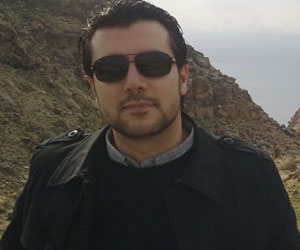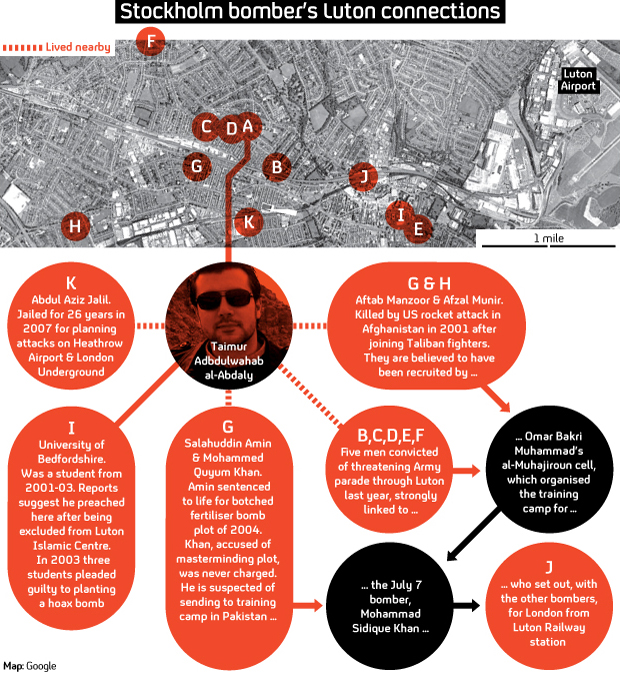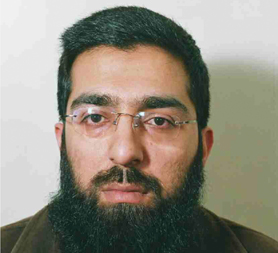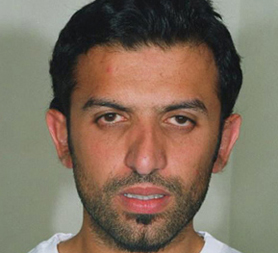Stockholm suicide bomber lived near terrorists
As MI5 continues to investigate whether Taimur Adbdulwahab al-Abdaly had links to other terrorists, Channel 4 News discovers that he lived close to numerous Luton-based extremists.

Iraqi-born Abdaly, 28, killed himself and wounded two people in the suicide attack in the Swedish capital of Stockholm at the weekend.
Officials have said that he packed his white Audi with gas canisters, but initial evidence showed that that it failed to explode and Abdaly was killed when explosives strapped to his chest detonated earlier than he had planned, when he was several hundred feet away.
Investigators initially said that the crude execution of the attack suggested Abdaly could have been working alone, but MI5 sources told the Telegraph newspaper yesterday that it was in fact looking in to whether he had links to other terrorists in Luton.
The newspaper said that the possibility of ties between the father-of-three and one of the ringleaders of the botched 2004 fertiliser bomb plot was being examined.
And today, Channel 4 News has found that Abdaly lived in a roughly two square mile area peppered with the homes of individuals with known extremist links, including the man suspected of masterminding the fertiliser bomb plot and a convicted member of the so-called Luton Cell which planned to blow up Heathrow Airport, the London Underground and other high profile targets.

Suspected fertiliser plot mastermind
Just three minutes walk away from Abdaly’s terraced home on Argyll Avenue, Mohammed Quayam Khan lived on Stratford Close.
Quayam Khan, known to intelligence officials as ‘Q’, knew the leaders of the fertiliser gang, who in 2004 planned a series of bomb attacks on a range of potential targets including the Bluewater shopping centre in Kent and the Ministry of Sound nightclub in London.
Quayam Khan was also alleged to have sent Mohammed Siddique Khan, the leader of the July 7 bombers who killed 52 people in 2005, to a terrorism training camp in Pakistan.
Evidence which helped convict members of the fertiliser gang came from an Al Qaeda supergrass Mohammed Junaid Babar – a self-confessed terrorist.
According to Babar’s witness statement, Siddique Khan was sent to Pakistan in 2003 by Quayam Khan, where he trained at a terror camp set up by Sajil Shahid.
Shahid was the leader of a Pakistan cell of al-Muhajiroun, the British-based group which has links to al-Qaeda.
At the camp, Siddique Khan fired various weapons including pistols, rifles and rocket-propelled grenades.
Quayam Khan appeared in the parliamentary Intelligence and Security Committee’s 2009 report on whether July 7 could have been prevented.
It read: “In early 2003, MI5 obtained intelligence indicating that an individual called Mohammed Quayam KHAN, from Luton, was the leader of an al-Qaeda facilitation network in the UK. As a result of this intelligence, MI5 made Mohammed Quayum KHAN a “desirable” target and began an investigation into the facilitation network. This operation was given the codename CREVICE.”
Police taped Quayam talking to Mohammed Sidique Khan two years before the London bombings but have never found sufficient evidence to arrest or charge him.
Salahuddin Amin, who was sentenced to life for his role in the botched fertiliser bomb plot in 2007, also lived in the Bury Park area.

Convicted Luton cell member
Less than a mile away from where Abdaly lived with his Romanian-born wife and three young children, Abdul Aziz Jalil lived on Dallow Road.
Jalil was jailed for a total of 26 years in 2007 after pleading guilty to a litany of charges, including conspiracy to cause explosions, relating to his role in the so-called ‘Luton cell’, which in 2004, planned to carry out a series of attacks on a number of targets in the UK and US, including Heathrow Airport, the London Underground and various financial buildings.
Jalil, who also attended terror training camps in Pakistan, assisted with research into radioactivity.
He rented a safe house in Luton for ringleader Dhiren Barot, where planning material was kept and his fingerprints where found on documents relating to chemicals.
Alleged al-Qaeda operative, Muhammad Naeem Noor Khan, who was believed to have been the mastermind of the botched attacks, also lived in the Bury Park Area. He has never been charged.

Army abusers
And Abdaly lived a matter of metres away from several of the five men convicted on January 11 of threatening an Army Regiment parading through the Luton town centre in March last year.
The 2nd Battalion’s (The Poachers) homecoming parade was marred by the group. Munim Abdul of Highbury Road, Jalal Ahmed of Cavendish Road, Yousaf Bashir of Dane Road, Shajjadar Choudury of Essex Close and Ziaur Rahmann of Nunnery Close, shouted and chanted at the soldiers, accusing them of being rapists, murderers and baby killers.
The group has been linked strongly to al-Muhajiroun and Anjem Choudury – a former leader of the group until it was banned by the government in 2005 – who protested outside court during sentencing.
Coughing on tape
Yesterday, Swedish investigators said they believe that Abdaly may have had help from others in planning his attack.
They are investigating the audio message sent to police and a Stockholm news agency before the attack, in which a man thought to be Abdulwahab warned that “we are for real and do now exist among you Europeans”.
A cough on the recording, believed to have been sent from the extremist’s mobile phone, may have been made by another person.
They are also examining messages posted by an admirer who has threatened more such attacks if Western troops did not withdraw from Afghanistan.
The activist, who signs messages Abu Suleiman al-Nasser, drew interest from investigators on Sunday when he published a photograph of the bomber, Taymour Abdulwahab, and named him publicly before the authorities had done so.
“Publishing the photograph is particularly worrying,” said Magnus Ranstorp, Research Director at the Center for Asymmetric Threat Studies at the Swedish National Defence College.
“Who is this person Abu Suleiman? Why does he have such good intelligence? Unless authorities can find this individual, and make tracking him down a high priority, there may be other attacks, there may be other strands to this.”
University
Last night, the university where Abdaly was enrolled on a sports therapy course from 2001-03 – the University of Luton, which is now part of the University of Bedfordshire – distanced itself from the bomber.
Reports are emerging that after being excluded from the Luton Islamic Centre at the tail end of 2007 for his radical interpretations of the Koran, Abdaly could have preached radical sermons at the univeristy.
“The university and its students refute any implication that it is or even has been involved in extremism of any sort,” said the Vice Chancellor, Professor Les Ebdon.
“In the sort of world we all live in we are not complacent and would always give our full co-operation to any of the appropriate authorities.”
He added: “The university enjoys a good relationship with all its student societies, including the Islamic Society. All student society speakers are approved by the students’ union and the chaplaincy.”
Three students from the university pleaded guilty to planting a hoax bomb in 2003. Azhar Ali, Wajad Majad and Abdul Malik were sentenced to two years in jail.
‘We’ve not done enough’
David Cameron conceded that his government and previous administrations had not done enough to stop the spread of radicalisation, during Prime Minister’s Question Time, this afternoon.
He said: “If we’re frank on both sides of the house, we have not done enough to deal with the promotion of extremist islamism in our own country.
“Whether it is making sure that imams coming over to this country can speak English properly, whether its making sure we de-radicalise our universities, I think we do have to take a range of further steps and I’m going to be working hard to make sure that we do this.
“Yes, we’ve got to have the policing in place, yes we’ve got to make sure we invest in our intelligence services, yes we’ve got to co-operate with other countires, but we’ve also got to ask why it is that so many young men in our own country get radicalised in this completely unacceptable way.”